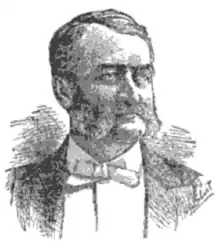William Andrew Sutherland
William Andrew Sutherland (May 30, 1849 – March 11, 1908) was an American lawyer and politician from New York.
William Andrew Sutherland | |
|---|---|
 | |
| Born | May 30, 1849 Hopewell, New York |
| Died | March 11, 1908 (aged 58) Rochester, New York |
| Education | |
| Occupation | Lawyer, politician |
| Political party | Republican |
| Spouse(s) | Inez L. Jackson
(m. 1878; died 1905)Clara E. Bowen (m. 1906) |
| Children | 1 |
| Signature | |
Life
Sutherland was born on May 30, 1849 in Hopewell, New York. He was the son of Rev. Andrew Sutherland and Mary McLeon. He attended the Genesee Wesleyan Seminary and Genesee College in Lima, New York.[1] He was a member of the Psi Upsilon fraternity.[2]
After finishing school, Sutherland read law in the office of future New York Supreme Court Justice Edwin A. Nash. He was admitted to practice in 1874.[3] He practiced in Lima until 1876, when he moved to Mount Morris. He served as Clerk of the Livingston County Board of Supervisors in 1876, 1878, and 1879. He moved to Rochester in 1884.[2]
In the 1891 New York state election, Sutherland was the Republican candidate for Attorney General of New York, but he lost the election to Simon W. Rosendale.[4] He was a member of the Republican National Committee from 1892 to 1896.[3] He was a delegate to the 1896 Republican National Convention.[5]
Sutherland was an associate consul for the Lexow Committee. He was president of the Rochester Bar Association and corporation counsel for Rochester. He was also a director of the Central Bank of Rochester.[6]
Sutherland became a mason in 1870, and later joined the Scottish Rite, the Royal Arch Masonry, the Order of the Eastern Star, and the Knights Templar. In 1897, he was elected Grand Master of the Grand Lodge of New York.[7] He was also an honorary Grand Master of the Grand Lodge of Canada. He married Inez L. Jackson in 1878. They had one son, Carroll Arthur.[6] After Inez died in 1905, Sutherland married Clara E. Bowen. His brother, Arthur E. Sutherland, was on the New York Supreme Court. He was a Methodist until 1905, at which point he became a Presbyterian.[8]
Sutherland died in Rochester City Hospital on March 11, 1908, a few weeks after he was appointed counsel for the New York Public Service Commission's Second District and began suffering from a nervous breakdown.[8] He was buried in Creekside Cemetery in Churchville.[9]
References
- Leonard, John W.; Marquis, Albert Nelson (1903). Who's Who in America. Volume 3. Chicago: A. N. Marquis & Company. p. 1447.
- Johnson, Henry Clark; Williams Jr., Edward Higginson (March 1888). The Tenth General Catalogue of the Psi Upsilon Fraternity. p. 796.
- Hamersly, L. R. (1905). Who's who in New York City and State (Revised ed.). New York City: L.R. Hamersly Company. pp. 872–873.
- Lloyd, Will L. (1892). The New York Red Book. Albany: James B. Lyon. p. 76.
- Harvey, Charles M. (1896). Republican National Convention, St. Louis, June 16th to 18th, 1896. St. Louis: I. Haas Publishing and Engraving Company. p. 196. hdl:2027/uva.x002450451.
- The National Cyclopaedia of American Biography. Volume XiI. New York: James T. White & Company. 1904. pp. 441–442.
- "The Grand Master". Masonic Standard. 1 (1). April 16, 1898. p. 1.
- "Death Comes to W. A. Sutherland". Rochester Democrat and Chronicle. March 12, 1908. p. 13.
- "William Andrew Sutherland (1849-1908)". Find a Grave. Retrieved June 27, 2020.